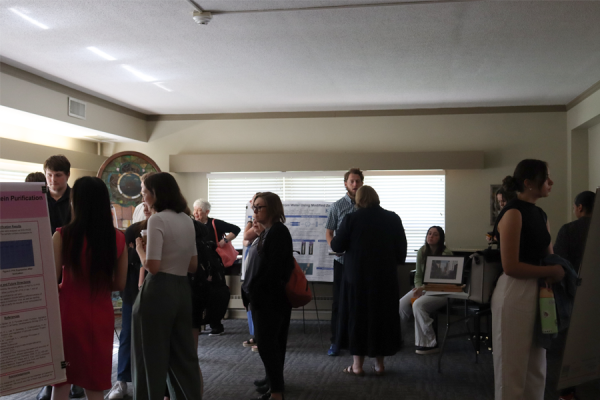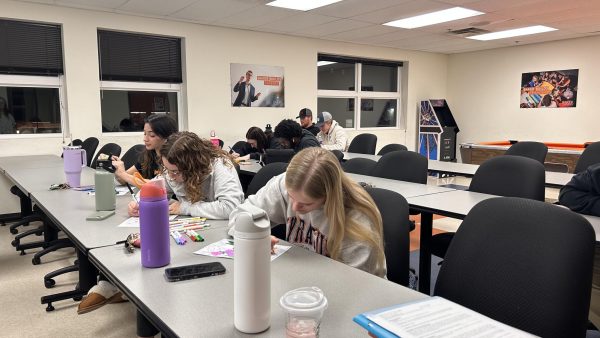Texas’ Heartbeat Act: What Next?
Protests arose in the state of Texas after The Heartbeat Act was set in place on Sept. 1.
On Wednesday, September 1, the Texas Heartbeat Act went into effect. The law prohibits abortion after six weeks of pregnancy, when the first fetal heartbeat can be detected. This legislation sparked discussion across the nation as many feared for the future of women’s access to reproductive healthcare.
“My initial thought was just shock, like ‘I can’t believe that they got this to pass’,” sophomore Peyton Sannan said. “After the shock settled, it was ‘oh my god, that’s actually kind of scary for women and the fact that Greg Abbott ― a straight, heterosexual white man ― was the one who passed the original law’.”
Prior to this legislation, the national regulations for abortion had been set by the 1973 court case Roe v. Wade. The court ruled that the state could not regulate any abortion up to the first trimester, which lasts approximately 13 weeks. If the state were to interfere any earlier, it would be a violation of a woman’s reproductive rights.
At only six weeks, Texas now has the strictest limitations on receiving a legal abortion. While some see this as a cause for concern, others see this as a cause for celebration.
Senior Mackenzie Garber explained part of her hope is that the law will prevent women from experiencing mental health issues as a result of an abortion. “It’s a step in the right direction to protecting mothers, especially from the consequences that come along with abortion,” Garber said.
However, at the time of writing, research has not yet proven a correlation between the two.
The legislation expands beyond the loss of access to legal abortions. Another section of the Heartbeat Act stipulates that private citizens will be able to sue anyone who either performs or assists in the abortion process. This includes driving a patient to an appointment.
Even those who approve of the restriction have some hesitancy about the criminalization. Garber believes these stipulations penalize the wrong people.
“Nobody wants to be put into that position of being that woman or having someone they care about go through [an abortion],” Garber said. “That’s not who should be punished for the act of abortion. [The punishment] needs to be more focused on the ones performing it instead.”
The Supreme Court refused to block the Heartbeat Act in a 5-4 ruling on September 1. Sannan recalls reading Justice Sonia Sotomayor’s dissent in which she criticizes the government for turning the citizens into “bounty hunters”. The upholding of the legislation opens the door for other states to reassess the possibility of increasing restrictions on abortion services.
“If Roe v Wade is to be overturned, there’s a really good likelihood that a lot of other red states are going to follow suit pretty quickly,” Sannan said. “So living in the Midwest, that would probably impact us significantly more than those on the coast.”
The solution to that, in Garber’s eyes, is legislative reform that better assists women in need. For example, passing more laws that hold fathers accountable, require child support even before birth or bring awareness to pregnancy service centers that will guide them through their term.
“I believe that a lot of women who are put in those terrible situations feel like often times abortion is their only option or they’re being pushed into it unwillingly,” Garber said. “It’s not just like ‘woo we solved the problem!’… We need to start stepping up in creating more support systems for women and making those options known to them.”
Legislation continues to fuel the “pro-life” vs “pro-choice” debate and leaves some uncertainty regarding the future of abortion access.
“As somebody who envisions having children later on in life, the thought of having a daughter ― and God forbid that something ever happens to her ― who would not potentially have those resources is really scary,” Sannan said. “The fact that there’s also been a big push to defund Planned Parenthood… it would cut off access to a lot of really important reproductive health services.”
In addition to providing abortions, Planned Parenthood also provides other healthcare necessities like birth control, STD testing, pap smears and contraception.
“We need to be a lot more careful with the decisions we make and do a better job at looking at the big picture,” said Sannan.
Visit Insight Women’s Center or Planned Parenthood for more information on available resources.
CORRECTION: An earlier version of this article stated that women who receive abortions are able to be sued by private citizens, when in fact the Heartbeat Act stipulates that those who perform or assist in abortions and not recipients are liable to private litigation. The error was corrected at 2:08 p.m. on Friday, Sept. 17.

Maria Gutierrez is a senior from Salina, Kan. She is a mass media major and a part of the Alpha Chi Omega sorority. In her spare time, she enjoys writing,...















